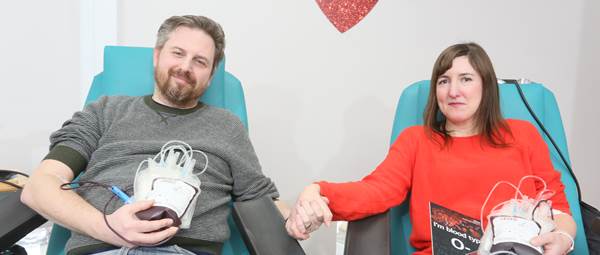Plasma – priceless to thousands of families
“Mum was told she had six weeks to live,” explains Steph. “That was 22 years ago. She is now the longest living small-cell lung cancer patient at the Queen Elizabeth Hospital in Birmingham.”
Steph was 17 when her mum Yvonne was given the diagnosis. Her sister, Sarah, was just four.
Yvonne’s longevity has been helped by intravenous immunoglobulin (IVIG) treatment every six weeks.
“Mum suffers very severe nerve pain,” says Steph. “She struggles to walk. She can only pick things up if she is looking at them.
“The immunoglobulin relieves the pain and improves her co-ordination.”
Immunoglobulins are medicines made from plasma donations. Over 50 different conditions are treatable with immunoglobulins, including cancers, and the demand for plasma to make these life-saving medicines is growing.
Yvonne is one of over 17,000 people in England who rely on plasma medicines. The medicine contains antibodies, which form part of the immune system. They help reduce the effects of her neuropathy – nerve damage from her own immune system mistakenly attacking her nerves.
The antibodies in the donor medicine help Yvonne’s immune system to self-regulate and calm down.
Now Steph has found a way to give back: plasma.
“Sarah and I went down to donate and it was smooth and painless,” says Steph. Sarah was not able to donate on the day and has instead registered to give blood, but Steph was able to make her first donation.
“The whole visit was an hour which could save someone’s life, so I would 100 per cent say to other people to go for it. There’s nothing to worry about.
Immunoglobulin strengthens or stabilises the immune system. Supplies are under pressure around the world and plasma donation will bolster availability of the medicine in England.
England relied on imported immunoglobulin for more than 20 years as a precaution against vCJD but the Medicines and Healthcare products Regulatory Agency (MHRA) said last year that plasma from UK donors can again be used for immunoglobulin.
Birmingham is one of three places in England where plasma can be donated, alongside Twickenham and Reading. Plasma can also be recovered from normal blood donations, to provide another source of supply.
“I know that imported immunoglobulin treatment is expensive and that more donations will help the NHS with costs and availability,” says Steph.
“It’s nice to do anyway,” says Steph. “But when you have that personal connection, it means a little more.”
Become a plasma donor
Already a plasma donor?
If you've already donated plasma, you can sign up for an online account to book and manage your appointments.


